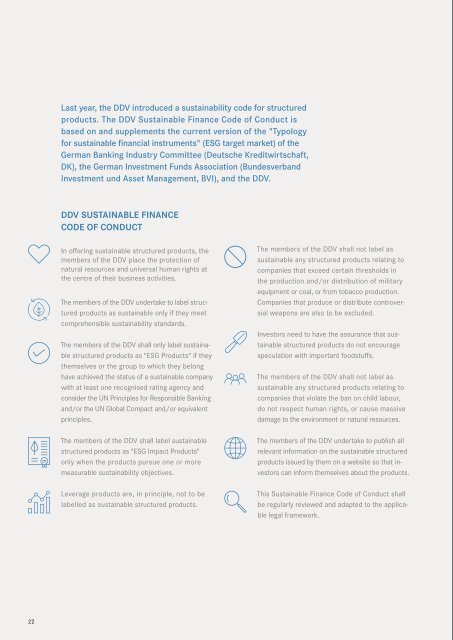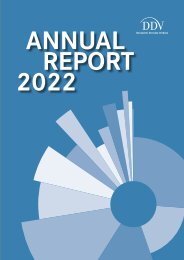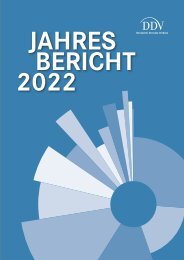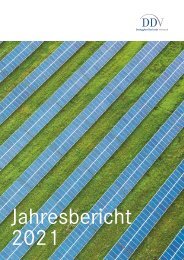DDV Annual Report 2021
Create successful ePaper yourself
Turn your PDF publications into a flip-book with our unique Google optimized e-Paper software.
Last year, the <strong>DDV</strong> introduced a sustainability code for structured<br />
products. The <strong>DDV</strong> Sustainable Finance Code of Conduct is<br />
based on and supplements the current version of the "Typology<br />
for sustainable financial instruments" (ESG target market) of the<br />
German Banking Industry Committee (Deutsche Kreditwirtschaft,<br />
DK), the German Investment Funds Association (Bundesverband<br />
Investment und Asset Management, BVI), and the <strong>DDV</strong>.<br />
Investing with a<br />
clear conscience<br />
Sustainable finance: Strengthening sustainable investments<br />
<strong>DDV</strong> SUSTAINABLE FINANCE<br />
CODE OF CONDUCT<br />
In offering sustainable structured products, the<br />
members of the <strong>DDV</strong> place the protection of<br />
natural resources and universal human rights at<br />
the centre of their business activities.<br />
The members of the <strong>DDV</strong> undertake to label structured<br />
products as sustainable only if they meet<br />
comprehensible sustainability standards.<br />
The members of the <strong>DDV</strong> shall only label sustainable<br />
structured products as "ESG Products" if they<br />
themselves or the group to which they belong<br />
have achieved the status of a sustainable company<br />
with at least one recognised rating agency and<br />
consider the UN Principles for Responsible Banking<br />
and/or the UN Global Compact and/or equivalent<br />
principles.<br />
The members of the <strong>DDV</strong> shall label sustainable<br />
structured products as "ESG Impact Products"<br />
only when the products pursue one or more<br />
measurable sustainability objectives.<br />
Leverage products are, in principle, not to be<br />
labelled as sustainable structured products.<br />
The members of the <strong>DDV</strong> shall not label as<br />
sustainable any structured products relating to<br />
companies that exceed certain thresholds in<br />
the production and/or distribution of military<br />
equipment or coal, or from tobacco production.<br />
Companies that produce or distribute controversial<br />
weapons are also to be excluded.<br />
Investors need to have the assurance that sustainable<br />
structured products do not encourage<br />
speculation with important foodstuffs.<br />
The members of the <strong>DDV</strong> shall not label as<br />
sustainable any structured products relating to<br />
companies that violate the ban on child labour,<br />
do not respect human rights, or cause massive<br />
damage to the environment or natural resources.<br />
The members of the <strong>DDV</strong> undertake to publish all<br />
relevant information on the sustainable structured<br />
products issued by them on a website so that investors<br />
can inform themselves about the products.<br />
This Sustainable Finance Code of Conduct shall<br />
be regularly reviewed and adapted to the applicable<br />
legal framework.<br />
Thinking about tomorrow today: Many people are now convinced of the need for<br />
sustainable business activities – both in Germany and around the world. Consideration<br />
of environmental, social, and governance aspects is thus becoming<br />
increasingly important to them. As such, sustainability has also become highly<br />
relevant when it comes to investing money – investors now ask not only about<br />
maturity, risk, and return, but also about how sustainable an investment is.<br />
The latest <strong>DDV</strong> issuer survey shows that two thirds of the issuers of structured<br />
products in Germany see sustainable investments as a driver of innovation for<br />
the industry in the coming five years – more so than any other issue. Around 74<br />
percent want to expand their product range in this segment in the coming year,<br />
and another 13 percent will potentially look into this.<br />
Sustainable finance as a core component of advisory services<br />
Many legislative projects pursue the objective of advancing the sustainable<br />
transformation of the economy. Among their goals, European countries want to<br />
promote a shift towards reduced carbon emissions. In concrete terms, companies<br />
are to use facts and data to clarify how their business is performing in terms of<br />
environmental and social issues, as well as corporate governance. On the basis<br />
of the information these companies provide, the financial industry will in future<br />
report the extent to which they have implemented key sustainability criteria.<br />
In any case, the financial industry plays a key role in the transition to sustainability<br />
due to the high level of investment this transition requires. With sustainable<br />
finance, the green economy has finally secured its place in the financial markets.<br />
From August 2022, sustainability will also be a core component of advisory<br />
services – investors will then have to be asked whether and to what extent they<br />
attach importance to sustainability in their investments.<br />
Investing sensibly – based on personal decisions<br />
People want to decide for themselves whether and how to pursue different sustainability<br />
strategies with their investments. A key prerequisite for this is that they<br />
are able to choose from all competitive investment solutions. There are often<br />
a range of different securities that can fit both the risk-reward profile and the<br />
22 23








